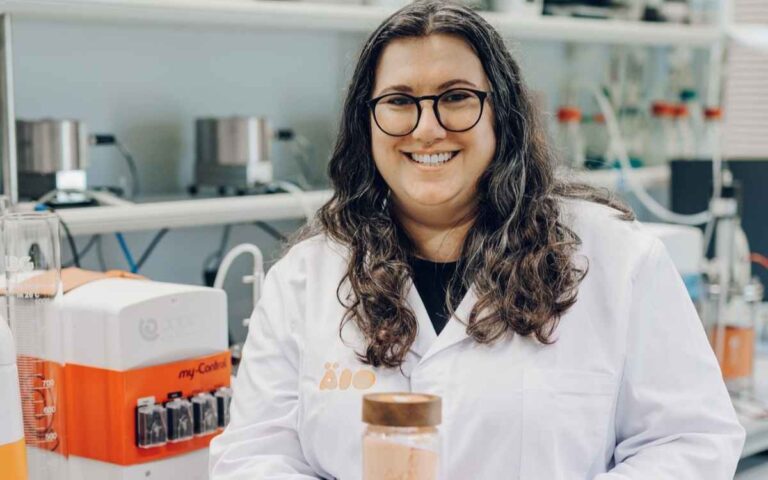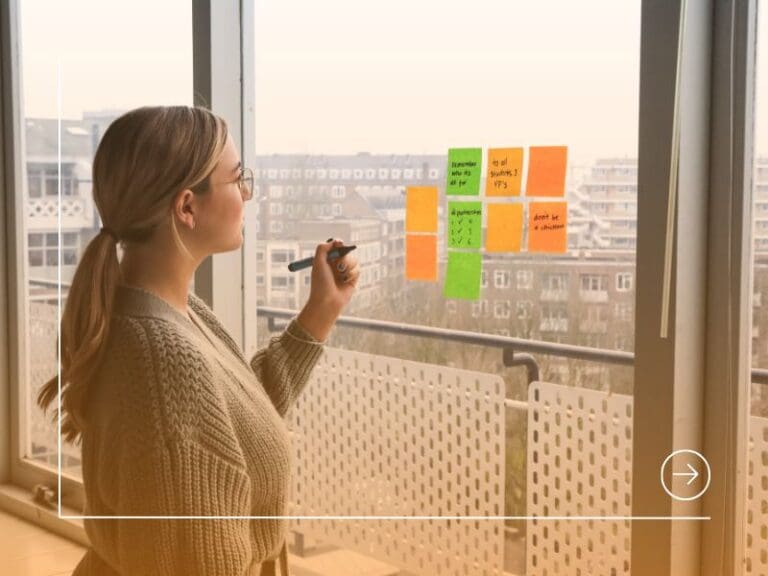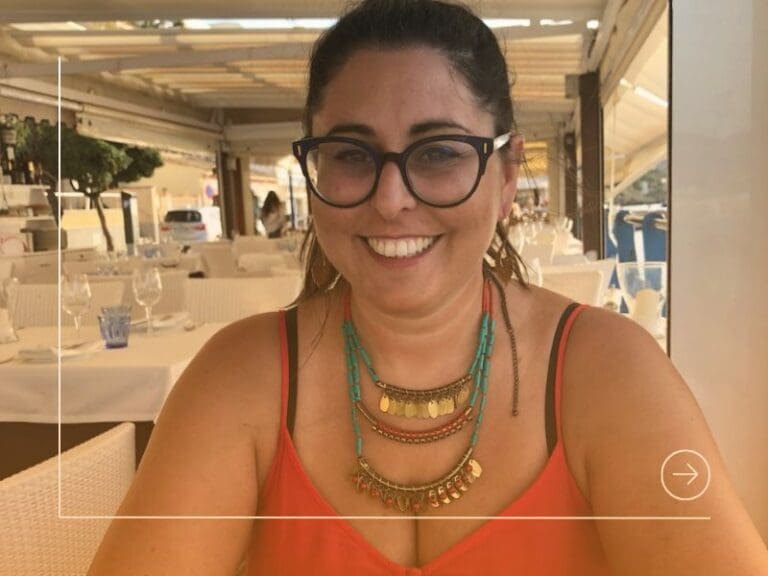Nemailla Bonturi is the CEO & Co-founder of ÄIO, a pioneering biotechnology startup dedicated to producing healthy and sustainable replacements to traditional fats and oils.
Originally from Brazil, Nemailla relocated to Estonia in 2016 to work as a researcher at the University of Tartu and later Tallinn Technical University, upon completing her PhD in Chemical Engineering, specialising in bioprocess development, at São Paulo’s State University of Campinas.
Nemailla has been living in Estonia for the last 8 years, where she found a strong community in food innovation, a supportive start-up network and her would-be co-founder, Petri-Jaan Lahtvee. Together, Nemailla and Petri-Jaan found a way to make food from sawdust, and ÄIO was born.
As co-founder of a bio startup and a woman born in the 80s, I’m not ashamed to admit I’m a product of ‘the Scully Effect’.
This is the name given to the phenomenon that saw a generation of young women inspired to pursue STEM careers following Gillian Anderson’s portrayal of the iconic The X Files character, Dana Scully. An FBI agent and a medical doctor, Scully was the first real example of a strong-minded, intelligent woman in a male-dominated field that I – and many like me – saw represented in mainstream media.
If there were any doubts about how much of an impact she had, there’s data to back it up. Research by the Geena Davis Institute found that women familiar with Scully’s character were 50% more likely to enter a STEM field, and almost two-thirds (63%) said Scully made them feel empowered to enter a male-dominated field.
Watching Scully on TV in my living room back in Brazil, I remember thinking, “at last”, a character who can kick ass and hold her own, whether she’s up against extra-terrestrial beings or just a room full of men – and she looks great in a suit.
Growing up, I loved SciFi. As a nerdy kid who loved science, comic books and superheroes, I was frustrated that there were no heroes I could look up to or see myself in as a woman. At the time, media portrayals centred on women’s roles as romantic partners, with very little life outside of pursuing a man.
So when Scully came around, I felt a shift. And after Scully, came Laura Dern and Jurassic Park. It was palaeontologist, Dr. Ellie Sattler, that sealed the deal – I was going to become a scientist, and I did.
Challenges and inspiration in academia
I pursued an education in biotechnology and chemical engineering, focusing on sustainable bioprocesses. What I loved about it was that it allowed me to combine all of the things I was most interested in: maths, chemistry, biology, engineering and cutting-edge technology.
In Brazil, women were always well-represented in academia. I had plenty of female professors and department directors to look up to or ask for guidance when needed. The gender split among my classmates, too, was fairly equal until PhD level, where it typically starts to tail off and become more heavily male.
But it wasn’t always smooth sailing. Whilst I’d always known it, it was around this time that I was confronted with how, as a woman, I’d have to work that extra bit harder to gain recognition compared to my male peers, even when my research spoke for itself.
The journey to entrepreneurship and my experience in Estonia
After finishing my PhD, I decided I wanted to come back and live in Europe permanently. I spent a year in Sweden and I loved living in a more egalitarian society that values further education and study.
I found a position at the University of Tartu in Estonia that aligned everything I wanted with everything I was good at, so I took the plunge and made the move from Brazil, working with bioprocesses and synthetic biology, which would eventually become the foundation of ÄIO.
Then we moved to join the Tallinn University of Technology. Tallinn has an incredible, close-knit startup community and just by talking to people, we were encouraged to turn what we were working on into a business.
In Tallinn, you’re constantly rubbing shoulders with serial entrepreneurs who have this free way of thinking. For them, it was as simple as, “Oh, you have a nice thing here – why not bring it to market? Why not make it a business?”
In Tallinn, failure is seen as a normal step in the path to success, it’s not something to be feared – just another lesson. When you’re having dinner with someone who just casually mentions they’ve launched their fourth startup, it’s difficult not to adopt that mindset as you see how possible these things are.
Even as for us, as scientists, who want to control every variable and are very risk averse, it became harder to argue against. But while we’re excellent scientists, we still weren’t business people, so we leveraged all the support we could from mentors and accelerators to ease the transition from academia to entrepreneurship.
There are parallels between academia and entrepreneurship such as the need for resilience and the ability to handle failure, but if I hadn’t moved to Estonia eight years ago, I don’t think I would have gone down the entrepreneurial path. The environment, positive representation and the help we were able to get made all the difference.
Gender bias, beauty standards and fundraising as a woman
Despite the supportive environment in Estonia, which punches above its weight in terms of supporting female talent, globally, there is still a major deficit in the number of female-led startups that receive funding vs. male. The current figures are around 2%.
When pitching ÄIO, I experienced firsthand some of the challenges common to female entrepreneurs. At one competition, I was told plainly by a coach that because I was a woman, people were already switched off and paying less attention, and I would need to try 10 times harder to get them to listen compared to my male counterparts.
Another suggested I lose weight so that investors take me more seriously. It was incredibly frustrating and eye-opening. No man was judged based on his appearance and how well he fit into a beauty standard, but I was.
Still, this only drove my determination to succeed exactly as I am and to show that my ideas, knowledge and qualifications are what matters – not how I look.
Seek sorority: Advice for women pursuing STEM careers or entrepreneurship
My most important piece of advice is to look after your mental health – and take it seriously. Early on, I experienced a lot of stress and anxiety, and I struggled with burnout as I felt the constant mental pressure associated with academia and later, the challenge of disconnecting from work.
In the entrepreneurial space, it’s a bit of a running joke to talk about burnout and you ask, “which one?” But it’s not something we should take lightly, and I want to highlight the need for self-care, therapy and setting boundaries to manage stress and maintain good mental health, which have all been fundamental for me.
There are times when I say to my co-workers I’m not going to be available for anyone, and then I just ignore my phone. As a contingency, I’ve given a few people emergency topics that they can call me on, but I’m quite disciplined about it now – necessarily!
I think it’s crucial to empower yourself through support from friends, mentors and the broader community of women, too. Find inspiration and encouragement from other women. There’s magic in women’s sorority, whether it’s ones you know personally or not. My ritual before any pitch or big meeting is listening to Beyoncé’s ‘Cozy,’ – a surefire way to boost my confidence and energy.








